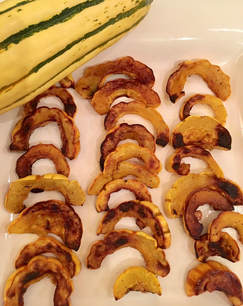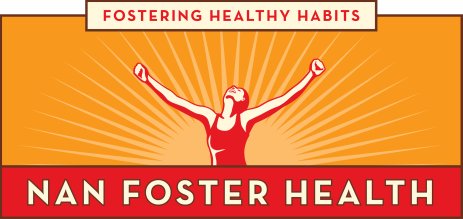Your stomach is the size of your fist. That's pretty darn small. Fill up on the important stuff first. Whether you are an omnivore or vegetarian, add in delicious, crunchy, savory and nutrient-dense veggies to meals and snacks to crowd out nutrient-poor, high-glycemic simple carbs (bread, potatoes, pasta, dessert). By adding in a wallop of veggies, along with the other basic building blocks of a healthful meal – clean protein and whole grains – you are occupying stomach real estate with guilt-free goodness.
Party Hacks
1. Remember what Michael Pollan advises, "Eat food, not too much, mostly plants." Fill up on veggies first at the party. Indulge in crudite, healthier dips like hummus and guacamole, and other vegetable appetizers noticing their crunch, flavor, and energy-boosting effects. Skip or just sample a cracker, cheese, or puffed pastry.
2. At dinner, cover half your plate with veggies and discover the energy and lightness that follows, not to mention the benefits of nutritious, high fiber satisfaction.
3. Have a glass of water or bubbly water along with any alcoholic beverage. This will help fill you up and prevent alcohol's dehydrating effect.
4. If you know you'll be enjoying some dessert at a party, avoid added sugar and simple carbs earlier in the day.
Loaded with vitamins, minerals and a rainbow of phytochemicals – plant nutrients that cool down inflammation and combat cancer-causing free radicals – vegetables are our best ally when it comes to crowding out foods that hijack health.
Benefits of Squash
With the abundance of winter squash now, I've been trying out new varieties and share my new fave with you, below. What's great about squash? While squash is considered by some to be a starchy vegetable, it is a complex carb delivering a whallop of immune-boosting, anti-inflammatory nutrition:
- 457% of the daily value per cupful of vitamin A! A great antioxidant Vitamin A is essential for good skin, vision, and mucous membranes. Research shows that vitamin A may protect against the risk of lung and mouth cancers.
- What's more, colorful flavonoids such as betacarotenes, cryptoxanthin-ß, and lutein convert to vitamin A in the body for even more protection.
- 42% daily of the value in vitamin C
- 17% and 18% daily values of potassium and manganese, respectively
- Healthful amounts of vitamins E, B, B6 (pyridoxine), thiamin, niacin, folate, calcium and magnesium, riboflavin, niacin, thiamin, and pantothenic acid
For cooking, squash is very versatile as a roasted root atop salads, shredded and sautéed into patties or pureed into soups. See my butternut squash recipe in my book, Gutsy.
Roasted Delicata Squash

Serves 4
Print Recipe
2 large or 3 medium Delicata squash
About 3 T olive oil
1/2 t salt
1/2 t pepper
Preheat oven to 450 degrees. Slice ends of of squashes. Cut each squash in half lengthwise. Using spoon, scoop out seeds. Turn squash pieces onto cutting board, flat sides down. Slice each piece widthwise into 1/2" strips. You will end up with semicircular arcs of squash. Place all pieces onto baking sheet. Lightly coat with olive oil, salt and pepper. Toss with hands until evenly coated. Spread out into one layer on sheet. Bake for 20 minutes, flipping pieces over after 10 minutes. Enjoy!
